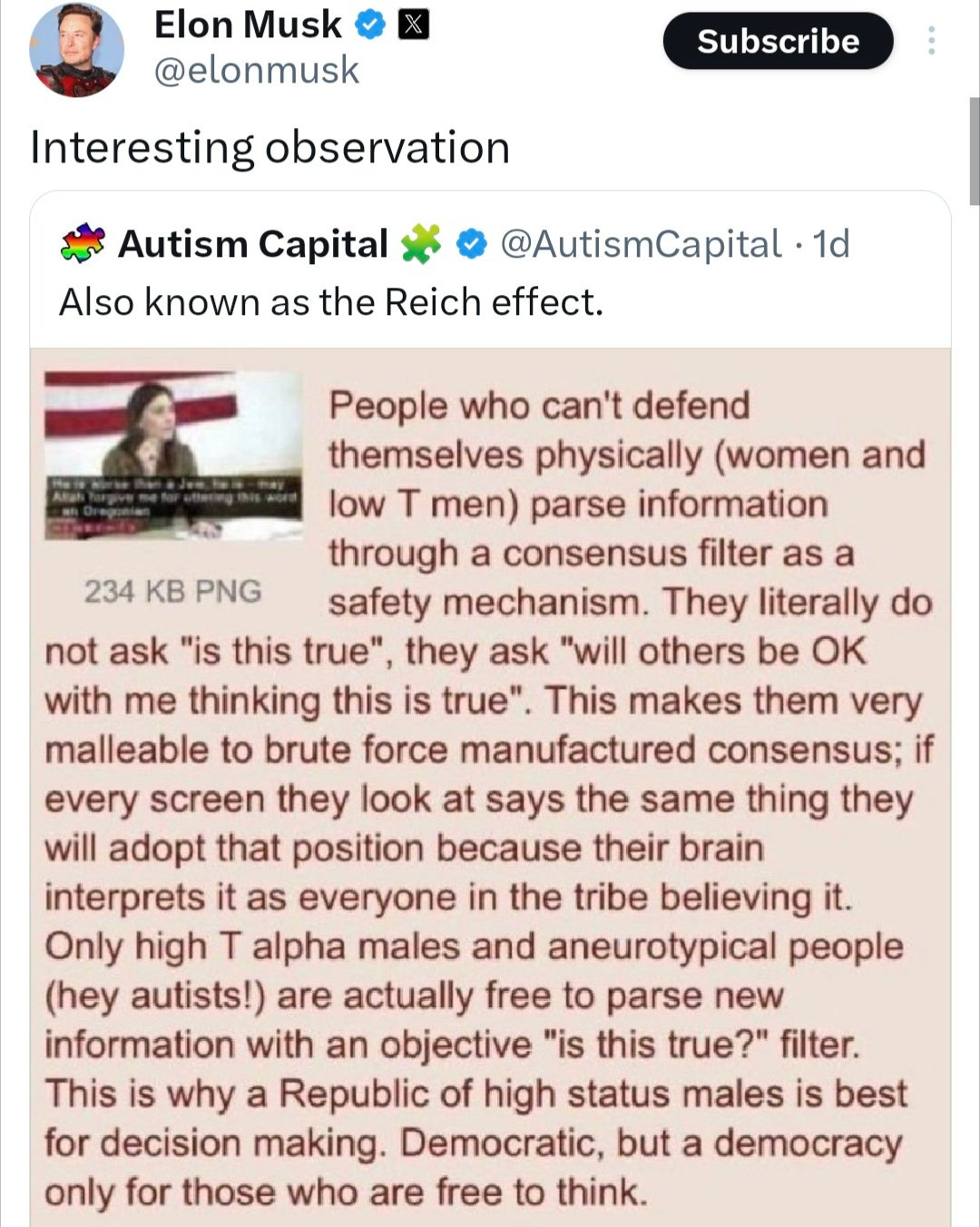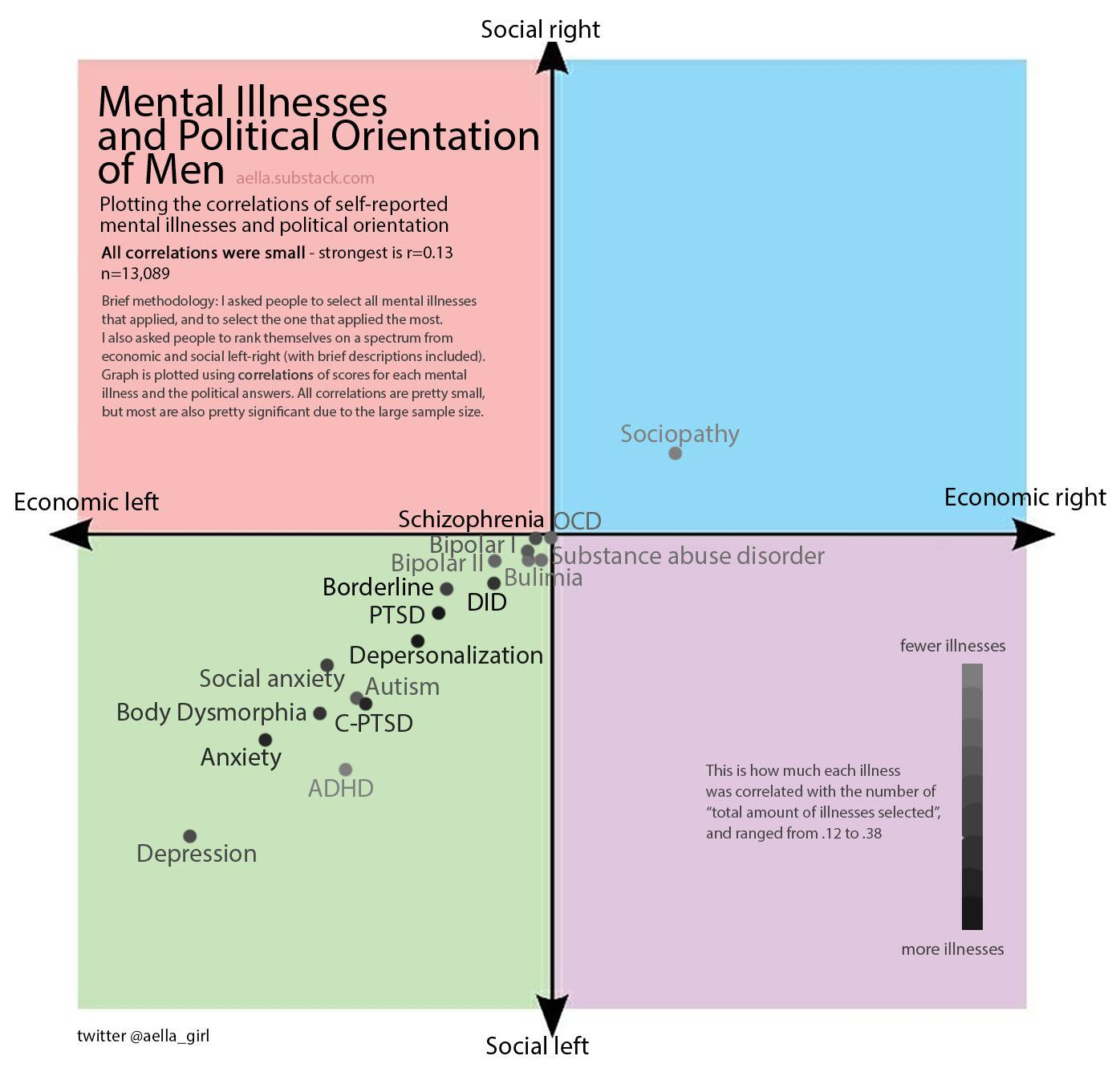Written by Seb Jensen.
The online right, and to a some extent broader society, have this mythical view of autism where autists are tragic superheroes who’re incapable of basic things like brushing their teeth but are able to become the best in the world at their own obsessive interests. Alternatively, autists are painted as cool-headed stoics who’re incapable of being influenced by left-wing propaganda on race and gender:
Both of these mythical views of autism are wrong. Autistic people are not more likely to be right-wing, and the link between genius and autism is overblown.
Autism and right-wing politics
For starters, autistic people are probably more vulnerable to propaganda than non-autistic people because being able to differentiate propaganda from other information is a social skill, so autistic people will naturally be worse at it. In addition, they are more likely to be left-wing than ordinary people – and even among people with mental disorders they aren’t unusually right-leaning:
The data come from one of Aella’s convenience samples, though unless there is some really weird selection or interaction effect going on, the association between autism and left-wing views should not be biased.
Autism and genius
There are examples of people on the spectrum who are extremely successful, like Elon Musk, Albert Einstein and some historical figures like (potentially) Isaac Newton. Of course, you can successful people with any mental disorder (e.g. Kanye is bipolar, Abraham Lincoln was depressed), though I will concede that, out of all mental disorders, autism seems to be the one that is the most highly correlated with eminence.
There are two ways one can think about this. Autism could be enabling these people to succeed. Or autism could be tagging along with high intelligence, which is what’s actually responsible for their success. I think the latter can explain most of the association – there’s just much more evidence for it. Common sense and piles of academic research suggests that intelligence enables success in life. And autism genetically correlates with educational attainment and intelligence, despite the fact that diagnosed autistics tend to be lower in intelligence than the average person. Hence there will be a surplus of autistic people (regardless of diagnosis) within groups of highly successful people.
On the other hand, there just isn’t much evidence for autism enabling genius besides the fact that it seems to have something to do with intelligence and there are all of these successful autistic people. Theoretically, being really into a few specific things could be an asset, but specificity comes at the cost of eminence: being the greatest philosopher ever is much more impressive than being the greatest intelligence researcher ever. And that’s not even considering the social and personal constraints autism imposes. Overall, I would say that autism is probably a plus when it comes to something that is extremely cognitive like science or rule-based like competitive gaming. But it’s a negative when it comes to, well, basically anything else in life.
What exactly is autism?
I subscribe to the theory that real autism is caused by brain architecture that optimizes too much for accuracy and dimensionality, and not enough for speed and convenience. In terms of their cognitive profile, autistic people tend to struggle the most with comprehension (a test of common sense) and digit symbol (a test of processing speed).
This explains some of the classic symptoms of autism: negative reactions to stimuli, repetitiveness and social incompetence. Autistic people dislike being overstimulated because processing more stimuli comes at the cost of less accurate neural processing. Social situations require “quick and dirty” thinking, so autistic people are naturally bad at them, and accuracy is much easier to maintain in specific, rule-based tasks.
Some have noted that autism and schizophrenia are to some extent opposing disorders. Autism can be seen as disordered high intelligence, while schizophrenia can be seen as disordered low intelligence. Autistic people are reluctant to accept patterns with insufficient validation, while schizophrenic people are inclined toward the opposite. There are also a few other areas in which autistics and psychotics diverge:
And yes, it’s bad
Beyond being bad at life in general, autistic people are particularly bad at social interaction. It’s easy to overlook this because NPCs constantly overrate the effect of communication when it comes to doing productive things, but being rude or unbearable will complicate the life of anybody who wants to get ahead or have a family. Men who fantasize about having an autistic girlfriend think that she’s going to care less about low status hobbies like gaming, doing drugs, or watching TV. In practice, an autistic girlfriend will be triggered every other week, might not even like touching or kissing, and will be very insecure.
What about the “double empathy theory”, which says autistic people can communicate well with each other but not with neurotypicals? That’s cope. Some autistic people hate confrontation and are evasive and two-faced, while other autistic people are extremely direct and confrontational. Something tells me that these two types would not get along. I guess autistic people might have some kind of mutual understanding that certain smells or noises are unpleasant, but the same could be said for two people who share literally any mental disorder. Similar people are better at empathizing with each other.
I’ve previously tweeted that there seems to be overlap between narcissism and autism. People responded that it might be related to the fact that both disorders involve deficits in empathy. Ignoring the controversy concerning autism and empathy, I’ve never liked the idea that a lack of empathy is linked to narcissism, which I associate more with self-enhancement and perception.
Human empathy is more politically and socially contingent than people acknowledge: whether somebody empathizes with another person can depend on race, gender, nationality, religion, political views and their own relationship to that person. Consider how people’s perception of their romantic partners changes after they break up with them. Although a narcissistic person might not lack empathy, their empathy might be more selective. Whatever the case, the internet’s wrong about autism.
A slightly different version of this article was originally published here.
Seb Jensen is an independent researcher with interests in intelligence and political science. He writes on Substack.
Support Aporia with a $6 monthly subscription:
You can also follow us on Twitter.








It's really unfortunate that one word, Autistic, is supposed to usefully describe someone like Elon Musk and a non-verbal, extremely low-IQ, severely disabled person.
That difference is why, in terms of studies, most of them are useless-to-misleading when it comes to non-disabled people with Autism.
I get rather annoyed with the "autism is a superpower!" people. Having a few autistic traits, such as an extremely single-minded ability to focus, is probably an advantage in some fields. But having enough autistic traits to merit an actual clinical diagnosis of autism (vs. a TikTok diagnosis based on criteria such as "am awkward in social situations" and "don't like loud places") is absolute NOT an advantage.
My eldest daughter's IQ places her in the gifted range; and she is also autistic. She has always excelled academically, but the non-academic demands of school, college, and grad school were debilitating to her. Social dynamics are baffling and stressful for her; her executive functions are somewhat impaired which makes time management and organization a struggle; and normal things like living in a dorm, having a roommate, and doing clinical practicum rotations that changed every few weeks took an incredible toll on her, resulting in severe anxiety and constant panic attacks. The all-or-nothing black-and-white thinking that autistics are prone to leaves her prone to depression - if she can't do something perfectly, she think she is a complete failure. She has a great therapist, and works hard to manage her mental health, but it is heartbreaking to see her struggle so much with basic life things.
Autism makes her life a lot more difficult; we call it "playing life in hard mode." I think she'd give anything to be less autistic, even if it meant a lower IQ.
The highly-successful autists out there are successful despite their autism, not because of it.
.